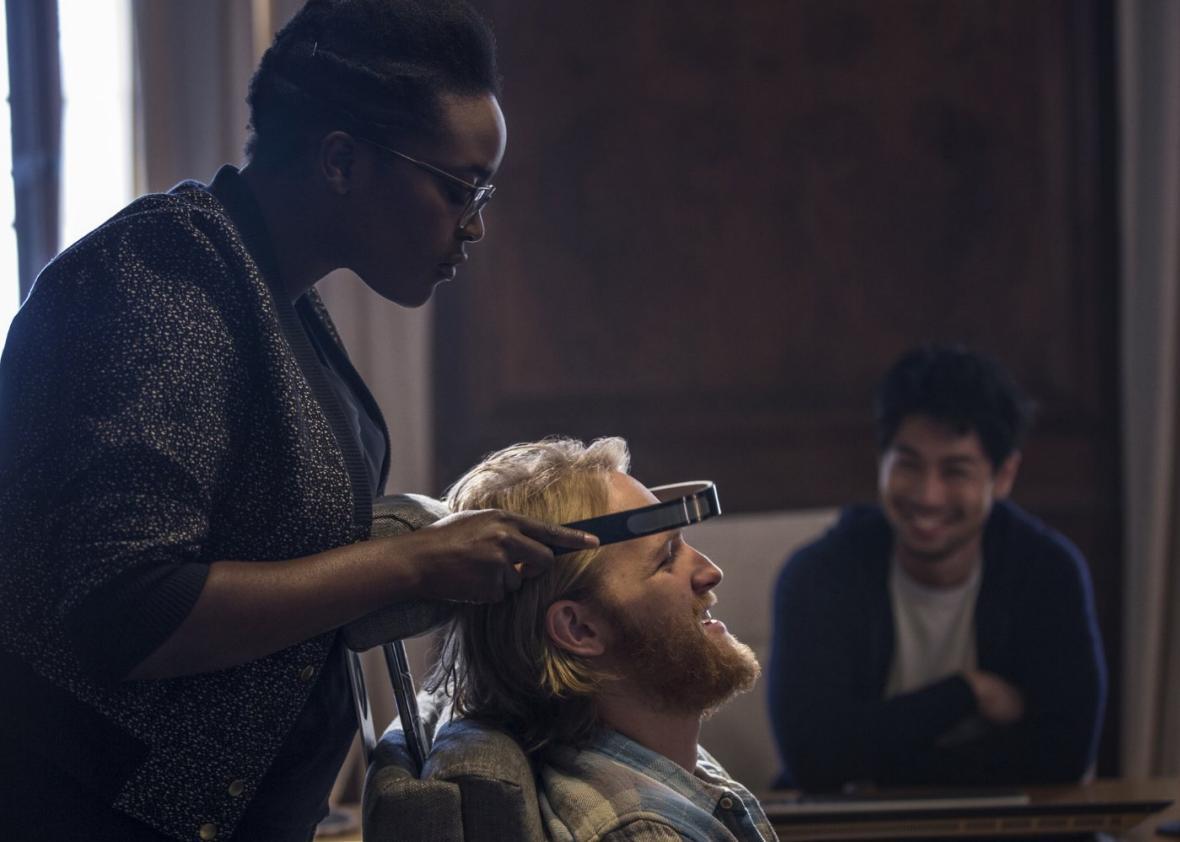It seems only a matter of time until Black Mirror, the brilliant series about the creepy potentialities of technology, does an episode about binge-watching, even if, at this point, that amounts to biting the hand that feeds it. Black Mirror has been available to American audiences largely in binge-watching form: The first two seasons, three episodes each, plus a Christmas special, aired initially on TV in the U.K. before streaming on Netflix. The service promptly funded the six-episode third season, which arrives on Friday. Binge-watching shows us the way a new technology can twist a certain innate tendency to couch potato–ness into something slovenly. Black Mirror, a title that refers to all of our endless screens darkly reflecting ourselves back at us, is interested in how new technologies, for better or worse, and usually worse, make us more human.
Each self-contained episode of Black Mirror features a different cast, a different premise, a different tone, a different world, and usually a different twist. Not all the episodes are created equal, but even the lesser installments give the series a sheen of impressive physical and mental athleticism. Every episode is so distinct, so varied, so polished, so full of ideas that taken all together they amount to a feat of imagination, if not a kind of strength. The new season opens with a bubblegum satire starring Bryce Dallas Howard and finishes with a police procedural starring Kelly Macdonald. In between it has a horror episode, a riff on ’80s coming-of-age movies, a war story, and the grimmest episode of the series since the season two reality-TV nightmare “White Bear.”
The new season is capable and enthralling, but binged all at once it has a heavier strain of didacticism than before. Black Mirror has always had a slant toward bleakness, an inclination to see technology as a means of multiplying our worst tendencies. But the first two seasons often evinced a greater curiosity about how human beings would react to futuristic forms of technology, even if the reactions the show imagined were reliably, by which I mean fallibly, human. In the series’ very first episode, the prime minister of England is blackmailed into having sex with a pig on national television, an insane-sounding premise that the show made plausible one sure step at a time, requiring barely more tech capabilities than we have now. It was the prime minister’s shame and his country’s reaction to and complicity in his shaming that were the episode’s subject.
Some of Black Mirror’s best episodes have been about one specific technological advancement, jolting the episode with a second pleasure: not just the unfurling of the story, but the unfurling of a new human capability, so close but yet still out of reach. Past episodes have explored a marriage undone by the ability to record all of one’s memories or the experience of grief when one can nearly reanimate a dead loved one. But five of the six new episodes focus on a fresh technology, and four of the new developments seem abjectly awful. You can understand why someone might try to bring a loved one back from the dead, but why would you ever want to live in a world where we treat one another like Yelp reviewers, constantly rating every interaction, a five-star system that determines class and privilege and that turns us into unhappy, overly polite, social media obsessives? The provenance of this idea is all around us—we’re already constantly in our phones, liking other people’s photos and tweets and status updates—but it’s still impossible to imagine one upside to such an arrangement. The episode is futuristic but not really imaginative: It works only as a satire of us in our current state, and it only wants to scold.
Still, in the scheme of television, there is hardly anyone I’d rather be lectured by than Black Mirror. By my scoring, the episodes are: sweet, bleak with a promising ending, bleak with a promising ending but also mass casualties, profoundly bleak, needlessly bleak, bleaker than all the rest. But the series is nonetheless a welcome antidote to the idiotic tech-utopianism of network television (check out the forthcoming Pure Genius, and consider turning your health care over to the nice version of Martin Shkreli) and so skillfully made that it gives food for thought even when hectoring.
The episode in which people constantly rate one another, for example, ends with a euphoric exchange of insults, a round of gloriously cathartic F-bombs. The war-set riff on The Twilight Zone’s “The Eye of the Beholder” is provocative and unsettling. There’s a little too much going on in the seemingly ’80s-set love story, but it’s about time someone put a lesbian couple at the center of such a story. There’s an episode that contains a lecture about internet outrage—what if it could be weaponized? What if horrible anonymous comments had consequences?—but it doubles as a well-made cop caper. The horror episode amounts to a pun, but Wyatt Russell’s performance as a goofy American backpacker is wonderful. Black Mirror leaves you feeling like you should turn all your screens off while making you incapable of doing anything but hitting “play next.”
Update, Oct. 20, 2016: This article originally included art from an earlier season. It has been updated with a still from the third season.
